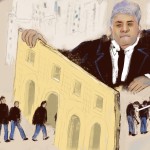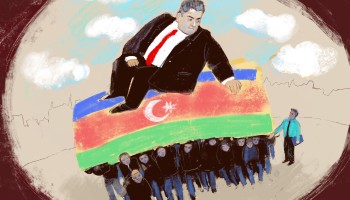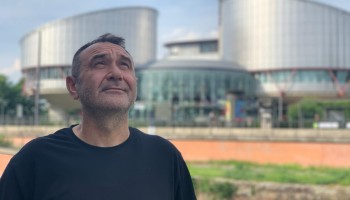The sun shone brightly in Strasbourg, and the modernist headquarters of the European Court of Human Rights gleamed behind Seudin Zoletić.
The tall, middle-aged father of two had travelled here from his small Bosnian hometown to see, with his own eyes, the place where his hope for justice might be fulfilled at last.
He was feeling optimistic. “If we hadn’t come here, we probably wouldn’t have achieved anything,” he said. “Now that we’re here, we’ve increased the chances of a positive [decision].”
“[That] would be my greatest satisfaction. My happiness, my pride. ... It will mean that justice won.”
More than a decade ago, Zoletić and hundreds of other workers from Bosnia and Herzegovina, Serbia, and North Macedonia were lured to the oil-rich Caucasian nation of Azerbaijan with promises of wages far higher than what they could earn at home. Instead, they were forced to toil on construction sites under brutal conditions, beaten, and humiliated. Many were paid nearly nothing.
The exposure of their exploitation in the fall of 2009 caused a public scandal. It was one of the largest such cases in modern Europe, with hundreds of victims and rumors that powerful figures were behind the construction projects, many of which were financed by the government.
But the workers were never recognized as human trafficking victims, and senior Azerbaijani officials attributed their complaints to a labor dispute with their employer. Police and prosecutors conducted no investigation. To make the problem go away, the workers were summarily deported. And, on a misleading technicality, local courts swiftly dismissed their claims against the company that recruited them — one that appears to be owned by the family of a powerful minister. As a result, no one in Azerbaijan has ever been held legally responsible for their exploitation.
That’s why, 10 long years after the men returned home, their case against the country’s government now stands before the European Court in Strasbourg. This year, it is expected to make a decision at last.
In the face of silence, stonewalling, and even outright threats from Baku, getting this far has required arduous efforts by human rights advocates.
Alovsat Aliyev, a well-known Azerbaijani activist, first discovered the workers, publicized their case, and pursued their claims against their employers. To secure their testimonies before it was too late, a Serbian anti-trafficking organization met them as they arrived home and produced a report that spurred a criminal case in Bosnia and Herzegovina that led to several convictions. The workers’ cause has since been taken up by the country’s representative at the European Court, who submitted a forceful argument in their support.
The lengths these advocates had to go to illustrates the immense challenge of prosecuting human trafficking and labor exploitation cases, particularly when influential insiders have an interest in keeping them under wraps. Their efforts are particularly noteworthy because the stakes are so high: If the court finds Azerbaijan guilty, it will establish a strong precedent of accountability for failure to prevent gross human rights abuses.
“This is the only case ... at the level of the European Court in which the applicants allege that they were trafficked, or made to perform forced labor, on construction sites that were actually commissioned by the state,” said Boris Topić, the OSCE’s National Anti-Trafficking Officer in Bosnia and Herzegovina.
“If the court rules in the workers’ favor, it will be a powerful message not just to Azerbaijan but also to other members of the Council of Europe: That they need to perform due diligence when they decide about engaging private companies.”
“Impunity Remains Widespread”
Trafficking for labor exploitation is a violation of the Universal Declaration of Human Rights, and broadly recognized as a crime. It is also widespread, often hidden, and seldom punished.
“Ruled by Mafias”
The first outsider to recognize the workers’ plight was Alovsat Aliyev, a former senior official in Azerbaijan’s interior ministry who had founded an independent migrants’ rights organization, the Azerbaijan Migration Center.
In October 2009, one of the Bosnian workers contacted the group after finding one of its informational pamphlets. He said there were hundreds of other Balkan workers in the country, living in appalling conditions. While laboring for months on high-profile construction projects — one of which is now owned by the country’s first family — they had been beaten, starved, and denied the pay they were promised. Two had died in the appalling conditions.
Aliyev quickly started mobilizing his many contacts.
Through the OSCE and the German, French, and American embassies, he secured emergency food supplies and medical assistance for the men. He called journalists to report on their abuse, raising public pressure on SerbAz, the company that had brought them to Azerbaijan.
He also collected the men’s testimonies and sent them, along with photographs of their living conditions, to prosecutors and interior ministry officials.
“When I uncovered this case, I thought I was doing a good thing for Azerbaijan,” he said. “I thought it was the criminal elements who invited the foreigners and exploited them. I thought the government of Azerbaijan would stand behind me and help me.”
Within a week of discovering the workers’ compound, Aliyev was invited to the Ministry of the Interior to speak with Javad Shixaliyev, the head of its anti-trafficking department. But to Aliyev’s shock, the senior official told him to leave the affair alone.
“Go home and do your thing,” he recalled Shixaliyev saying. “Why are you getting involved in these problems? There will never be a criminal case. ... You don’t know who’s behind this.” Reporters’ inquiries to the interior ministry about Shixaliyev’s role went unanswered, with a deputy minister simply reiterating that there had been no abuses.
Aliyev said he had similar conversations with other senior officials, including a deputy interior minister and an assistant to the prime minister. Their responses led him to question everything he had believed. Even now, retelling his story to reporters, he struggled to contain his emotions.
“This was a catastrophe for me,” Aliyev said. “I don’t even know how to describe it. For the first time, I thought, yes, this really is not a democratic country. It’s ruled by mafias. It’s ruled by groups of people who don’t know what government is, what governance is, what human rights are.”
And even as government officials were privately telling him to back off, Aliyev said, they publicly insisted that nothing was wrong.
On October 27, a week after the workers were found, Shixaliyev said publicly that his office did “not have information” about any rights violations. That same week, Deputy Interior Minister Vilayat Eyvazov, then Azerbaijan’s national coordinator on human trafficking, told members of parliament that the government bore no responsibility for the workers, since they had signed their employment contracts in their home countries.
Nor did Azerbaijani officials appear to make any effort to investigate. When workers agitating for back pay complained of receiving threats, the police did nothing. A memo the workers sent to prosecutors was left unanswered. And not a single official visited their compounds.
Before long, it was too late. Over the next few weeks, SerbAz haphazardly deported the workers, sending them home after forcing them to sign statements that they had not been mistreated. Though they were in Azerbaijan illegally and were clearly at the center of a major scandal, their handlers managed to get them through border control without any problems.
As with so many other cases of human trafficking, it appeared that the main source of evidence — the workers themselves — would soon be beyond anyone’s reach.
Fortunately, one of Aliyev’s many contacts made a key connection. As the workers were being deported, initially to Belgrade, an OSCE officer put him in touch with a Serbian anti-trafficking organization called Astra.
A Race to Collect Testimonies
The group’s founder and head, Marija Andjelković, described a chaotic and confusing few days. After receiving last-minute emails from Aliyev with flight information, she and her staff would race to Belgrade’s Nikola Tesla Airport to intercept the arriving workers before they dispersed.
The Astra staff picked out the men based on the way they spoke, their exhausted appearance, and, since they had been working in the sun, their tanned skin.
Part of the job was to provide immediate practical assistance. “It was very obvious that they were traumatized,” Andjelković said. Some could not even pay for a bus ticket to return home.
But above all, Astra’s task was to take down the men’s stories while they were still fresh and preserve a record so that legal action could be taken. The workers believed that their rapid deportation was engineered to obscure the evidence of their exploitation, and some were eager to explain what had happened to them. But they were accompanied by senior SerbAz staff in front of whom they were reluctant to speak.
“It was obvious that they wanted to talk. And it was very obvious that they were very frightened,” Andjelković said.
These SerbAz overseers apparently reported the workers’ meetings with Astra back to Azerbaijan, because soon the company started sending the remaining men to other regional airports, no matter where they were from. To get around this obstacle, Astra contacted organizations in Bosnia and Herzegovina and Croatia to ensure those arriving there would also meet humanitarian workers and have their testimonies collected.
Though the case was receiving media attention, Andjelković feared that police and prosecutors in the workers’ home countries would do little in response. Describing her state of mind as “desperate,” she decided that her organization would compile its findings into a report to spur greater action.
Over several chaotic days and nights, Astra managed to produce a 32-page document detailing the workers’ abuses and reconstructing the SerbAz management structure. Many of the details of the workers’ experience are only known because of this report. Astra then disseminated it as widely as possible, sending it to “international organizations, journalists, embassies — everything we had in the address book,” as Andjelković described it.
In Azerbaijan, where officials were uncooperative, there was no progress. “From Azerbaijan we had the smallest amount of information,” Andjelković said. “Somehow, from Azerbaijan, there was a wall.”
But in Bosnia and Herzegovina, growing international pressure had some effect. Spurred to action by Astra’s report, Bosnian prosecutors launched an investigation and asked the Azerbaijani government for assistance.
At last, the Azerbaijani police felt that they had to respond. Their own investigation, conducted a year after the workers left, found that no human trafficking or forced labor had taken place.
Nothing to See Here
Shixaliyev, the head of the interior ministry’s anti-trafficking department, released the results of his investigation in November 2010. It found that the workers had been given four meals a day, paid an average $2,000 to $2,500 a month, and were living in apartments that met all the required norms, including ample water, heating, and electricity.
“Legally and Reasonably Rejected”
Back in Azerbaijan, Aliyev was pursuing his own avenues. His organization filed complaints against police and prosecutors for failing to investigate the workers’ treatment, but this had no effect.
The next summer, his organization filed a civil case against SerbAz on behalf of 33 of the men, demanding payment of their wages and compensation for violations of their rights.
Zoletić, the worker who would later seek justice in distant Strasbourg, was one of the few willing to travel back to Azerbaijan to testify. “The others were afraid,” he said. “The OSCE office was going to provide accommodation and plane tickets, everything for us to go. Nobody dared.”
In the end, Zoletić didn’t go either. The trial lasted just a single day, with a Baku court reaching an immediate decision to dismiss the workers’ claims. Its ruling was based on SerbAz’s assertion that, in fact, the workers had no “labor relationship” with the company, since they had been hired by its corporate parent, a separate legal entity based in the Caribbean territory of Anguilla.
Aliyev’s organization appealed the decision twice, taking the case to Azerbaijan’s Supreme Court.
These appeals were both denied, with the Supreme Court again noting that “the defining fact for satisfying the plaintiffs' [workers’] claims is to determine whether they have an employment relationship with the defendant, Serbaz.”
“As Seudin Zoletic and the other plaintiffs did not have a labor relationship with the defendant,” the court ruled, “there was no legal basis for their claim for delayed payment. Therefore, their claim was legally and reasonably rejected.”
In reality, the workers had never heard of the offshore Anguillan company, and believed they had been hired by SerbAz, based on what they had been told by managers and experienced on the construction sites. Moreover, Bosnian investigators subsequently found that they had never signed an employment contract with any company.
Aliyev, who testified in court, considered the decision politically motivated.
“The national coordinator on human trafficking comes out in parliament during the trial, the trial isn’t over yet, and says, ‘there’s no human trafficking there.’ It’s a direct order to the court,” he said. “How can the court issue an objective ruling after something like that?”
In response to reporters’ inquiries about the case, Deputy Interior Minister Ismat Aliyev (who is not related to Alovsat Aliyev) wrote that the workers had been “voluntarily” brought to Azerbaijan on the basis of employment contracts they had signed with SerbAz, contradicting the Azerbaijani court rulings that they had “no labor relationship” with the company.
The deputy minister reiterated that the workers had signed statements that they had not been mistreated in Azerbaijan. In fact, they had been pressed to do so before they were allowed to return home.
The Devil in the Details
There is no direct evidence that the Azerbaijani courts dismissed the workers’ case because of political pressure. Experts say that such cases are notoriously difficult to prosecute for many reasons, including a lack of understanding among many judges about what constitutes human trafficking, the low social status of many victims, and the challenge of collecting evidence.
There were other signs, too, that Azerbaijani authorities had taken an interest in ensuring that no government figures would be implicated. A Bosnian lawyer hired to assist Aliyev’s organization in the civil case against SerbAz said he encountered numerous obstructions from the Azerbaijani side, including even a refusal to share basic records, such as court transcripts. He also described a threatening encounter with a border guard who made clear he knew the reason for his visit to the country.
In Bosnia and Herzegovina, the local investigation led to indictments of 13 local SerbAz supervisors who had recruited the workers and ruled their lives in Baku. During the investigation and afterwards, the Azerbaijani government made a spate of generous donations to the country. These included geriatric centers, a school for visually impaired children, a public memorial to a beloved children’s author, and the construction of a “friendship park” in the country’s capital, Sarajevo. The opening ceremony for the park was attended by Leyla Aliyeva, the daughter of the Azerbaijani president.
No accusations were made against anyone in Azerbaijan. In the end, four SerbAz supervisors admitted their guilt; one was sentenced to a year and nine months in prison and three were given suspended sentences. The others were found not guilty, and the matter is now under appeal.
Despite this mixed result, the Bosnian case represents a landmark human trafficking prosecution, in part because law enforcement officials conducted an unusually thorough forensic investigation.
“To my knowledge, [this was] one of the most complex financial investigations in a trafficking persons case in the region,” said Davor Raus, a human trafficking specialist with the United Nations Office of Drugs and Crime. The case, he said, is widely studied and discussed in the regional anti-trafficking community.
“Are You Tired of Life?”
Back in Azerbaijan, Alovsat Aliyev said, he paid a price for his efforts to get justice for the foreign workers. Even while they were still in the country, the initially friendly warnings from officials had been replaced by direct threats by unknown figures.
Someone dialing from a hidden number asked him if he was “tired of life.” Other calls woke him in the middle of the night.
He also said he was followed by cars without license plates. He changed his usual route home, but to no avail. Once, after two cars tried to box him in on the road, he came home and bundled his family to his brother’s house in the middle of the night.
Aliyev suspects that those “hunting” him, as he describes it, were Interior Ministry operatives.
“It wasn’t in Azerbaijan’s interest for 750 victims of human trafficking to be discovered,” he said. “You see, every year the [United States] State Department prepared a report, and this was [seen as] bad for Azerbaijan.”
A Much-Criticized Record
Aliyev’s suspicion that the government was concerned about such reports was well-founded. The regime spends considerable effort burnishing its image abroad and reacts harshly to criticism, particularly of its human rights record.
In the subsequent years, as the Azerbaijani government cracked down on independent activism and political activity, Aliyev said that officials’ attitude towards his work became increasingly hostile.
In 2014, he left the country and received political asylum in Germany, where he has now found himself under investigation for allegedly helping smuggle Azerbaijanis into the country.
The Ministry Responds
To Strasbourg
With all legal avenues in Azerbaijan now closed, Aliyev’s organization brought the workers’ case to the European Court of Human Rights in 2012.
Because Azerbaijan is a member of the Council of Europe, the international body that governs the court, the country is obliged to observe human rights standards enshrined in the European Convention on Human Rights. It is on these that the Azerbaijani government was now being challenged.
The Workers’ Claims
Though the Strasbourg-based court is expected to rule on the workers’ case later this year, its progress there was, for many years, in considerable doubt.
By the time the court accepted the case for consideration in 2017, five years after it was first submitted, the situation on the ground had changed, leaving the workers with few advocates.
Aliyev had fled the country. The Azerbaijani government cracked down on independent journalism and political activity, leading to an exodus of journalists, dissidents, legal professionals, and NGO workers. The OSCE, which had initially coordinated international legal action on the case, was also expelled from the country in 2015. The lawyer representing the workers at the European Court, Muzaffar Bakhishov, was disbarred in 2016, along with many other independent lawyers.
After accepting the application in 2017, per the usual procedure, the European Court invited the accused party, Azerbaijan’s government, to respond to questions and comment on the case.
The Azerbaijanis submitted a strongly worded 18-page response denying that any trafficking had taken place. The government claimed that the workers had never submitted any evidence to substantiate their allegations and had failed to exhaust their domestic remedies because they never filed any criminal complaints. The police had received no requests to investigate, they claimed, and no evidence of trafficking had been found.
The court gave the workers’ lawyer, Bakhishov, an opportunity to respond. But he appears to have made little effort to offer a counter-argument. After initially asking for an extended deadline, Bakhishov submitted a brief response that offered little additional evidence. He made no reference to the fact that four SerbAz employees had admitted their guilt and two had been sentenced to prison terms in Bosnia. He also submitted no evidence that Aliyev’s organization had asked police and prosecutors to investigate their treatment.
The workers’ case looked weak. But a third party to the case, the government of Bosnia and Herzegovina, was also given the opportunity to submit an observation. The country was represented in court by Belma Skalonjić, a woman who had carefully studied the issue and found herself personally motivated to press the workers’ arguments.
Skalonjić said the men’s testimony had shocked her when she first read the case file.
“Our deep conviction is that [the case represented] horrible human suffering. A severe, flagrant violation of the most basic guarantees that a human being has in the 21st century,” she said.
“[The workers] want so little, so little for themselves. That was special to me. They didn’t go to get rich.”
In response to the court’s questions, she submitted a lengthy and detailed observation that made the arguments Bakhishov didn’t. She pointed to the Bosnian prosecution and documented Azerbaijan’s long history of failing to prevent human trafficking. The fact that the workers had been brought into the country illegally, using tourist visas, should alone have served as sufficient motivation to investigate, she argued. The Azerbaijani authorities did not do so.
Moreover, she pointed to the failures of Azerbaijan’s court system even to consider the workers’ allegations that they had been deprived of their passports and physically mistreated.
In an interview, she explained that her country’s citizens “absolutely didn’t have any chance to exercise their right to fair trial before the courts in Azerbaijan.”
The government, she said, was responsible for what had happened to them.
“Firstly, through inspection supervisions on the sites where illegal work was taking place. Then, through court proceedings where you were deprived of your right to fair trial. Then, in the identification of victims and people entering Azerbaijan, for what purpose and under whose jurisdiction. Those were all failures of authorities in Azerbaijan to disclose, establish, prosecute and issue adequate punishments. ... Exactly this will be the case matter that will be examined before the European Court.”
If the court rules in the workers’ favor, it will order the Azerbaijani government to compensate them for what they went through. But for Seudin Zoletić, whose name appears in the title of the case — “Seudin Zoletic and others against Azerbaijan” — it’s more about justice.
“We have waited for a long time,” he said, “but it’s important that we persist and send a message to the whole world that justice won. I hope that nobody ever will experience what we workers experienced in Azerbaijan. Justice is slow, but sure.”
With additional reporting by Kelly Bloss.







